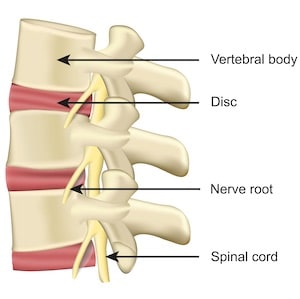Mark Kopec Now
Neck Surgery
Welcome to the Kopec Law Firm’s comprehensive guide on neck surgery malpractice, including cervical spine (neck) problems and the surgeries available to address them. On this webpage, we will discuss common cervical spine conditions, surgical treatment options, and potential complications that may arise during or after surgery. Additionally, we will explore the context of medical malpractice claims related to cervical spine surgeries. If you have been injured, you may need the Baltimore neck surgery lawyer.
Anatomy of the Neck with the Baltimore Neck Surgery Lawyer
The neck, or cervical spine, is a complex structure composed of seven vertebrae (C1-C7), discs, ligaments, muscles, nerves, and blood vessels. The cervical spine supports the head, allowing for a wide range of motion, including flexion (bending forward), extension (bending backward), rotation (turning side to side), and lateral flexion (tilting to the side).
Key Components of the Cervical Spine
- Vertebrae: The seven cervical vertebrae are the smallest of the spinal vertebrae. They are numbered from C1 (top) to C7 (bottom).
- Discs: These act as shock absorbers between the vertebrae, allowing for smooth movement.
- Ligaments: These connect the vertebrae and provide stability.
- Muscles: These muscles support the neck and allow for movement.
- Nerves: These transmit signals between the brain and the rest of the body.
- Blood vessels: These supply blood to the brain and neck.

Medical Conditions of the Neck That May Require Surgery
- Herniated disc: This occurs when the soft center of a spinal disc pushes through a tear in the outer layer. Symptoms include neck pain, arm pain, numbness, tingling, and muscle weakness.
- Degenerative disc disease: This is a condition that occurs when the spinal discs lose fluid and begin to deteriorate. Symptoms include neck pain, stiffness, and limited range of motion.
- Spinal stenosis: This is a narrowing of the spinal canal that puts pressure on the spinal cord and nerves. Symptoms include neck pain, numbness, tingling, and weakness in the arms and legs.
- Cervical radiculopathy: This is a pinched nerve in the neck that causes pain, numbness, and weakness in the arm and hand.
- Cervical myelopathy: This is a compression of the spinal cord in the neck that causes symptoms such as weakness, numbness, tingling, and difficulty walking.
- Cervical fracture: This is a break in one of the bones in the neck. Symptoms include neck pain, tenderness, and difficulty moving the neck.
It is important to note that not all neck conditions require surgery. Many neck conditions can be treated with conservative measures such as physical therapy, medication, and rest. Surgery is typically only recommended when conservative treatment fails to relieve symptoms or when the condition is causing significant disability. If you are experiencing any neck pain or other symptoms, it is important to see a doctor to get a diagnosis and determine the best course of treatment.
Conservative Treatment Options for Neck Pain
Before considering surgery, it’s important to exhaust conservative treatment options for neck pain. These may include:
- Rest: Avoid activities that aggravate your neck pain.
- Ice and heat therapy: Apply ice packs to reduce inflammation and heat packs to relax muscles.
- Over-the-counter pain relievers: Medications like ibuprofen or acetaminophen can help manage pain.
- Physical therapy: A physical therapist can teach you exercises to strengthen your neck muscles and improve flexibility.
- Massage therapy: Massage can help relax muscles and reduce pain.
- Steroid injections: Injections of corticosteroids can help reduce inflammation and pain.
Medical Providers for Diagnosis and Treatment
If you are experiencing neck pain, it is important to see a qualified medical professional for diagnosis and treatment. Here are some types of doctors and other medical providers who can help:
- Primary Care physician: Your primary care physician can provide initial evaluation and treatment for neck pain.
- Orthopedic surgeon: An orthopedic surgeon specializes in the musculoskeletal system and can diagnose and treat conditions affecting the cervical spine.
- Neurosurgeon: A neurosurgeon specializes in the nervous system and can diagnose and treat conditions affecting the spinal cord and nerves.
- Physical therapist: A physical therapist can teach you exercises to strengthen your neck muscles and improve flexibility.
- Chiropractor: A chiropractor can use spinal manipulation to treat neck pain.
The Baltimore neck surgery lawyer can evaluate the actions of the medical providers who saw you.
Available Surgical Treatments:
When conservative treatments fail to alleviate symptoms or when the condition is severe, doctors may recommend surgical intervention. The following are some common surgical procedures for cervical spine prob
- Anterior Cervical Discectomy and Fusion (ACDF): ACDF involves removing a damaged or herniated disc and fusing adjacent vertebrae using bone grafts or implants. This procedure aims to relieve pressure on the spinal cord or nerves.
- Posterior Cervical Decompression (PCD): PCD involves removing bone or tissue to relieve pressure on the spinal cord or nerves. This procedure is often performed for conditions such as spinal stenosis.
- Artificial Disc Replacement (ADR): ADR involves replacing a damaged disc with an artificial disc to maintain motion and alleviate symptoms. This procedure is an alternative to fusion surgery.
Potential Complications and Medical Malpractice Claims with the Baltimore Neck Surgery Lawyer
While cervical spine surgeries can be effective in treating various conditions, it is important to be aware of potential complications that may arise. Complications can occur due to various factors, including surgical error. Some potential complications include:
- Infection: Surgical site infections can occur, leading to pain, swelling, and potential complications if left untreated.
- Nerve Damage: In rare cases, nerves may be damaged during surgery, resulting in weakness, numbness, or paralysis.
- Failed Fusion: Fusion surgeries may not achieve the desired fusion, leading to persistent pain or the need for revision surgery.
- Hardware Failure: Implants used in fusion surgeries may fail, requiring additional surgery to address the issue.
- Anesthesia Complications: Adverse reactions to anesthesia can occur, although they are relatively rare.
Next Step: Call the Baltimore Neck Surgery Lawyer
Cervical spine problems can significantly impact an individual’s quality of life, and surgical intervention may be necessary in certain cases. Complications can occur during or after surgery and may be indicative of medical malpractice.
If you believe you have experienced medical negligence, it is advisable to seek legal advice from professionals experienced in medical malpractice claims. We can assess the specific circumstances of the case, evaluate the standard of care provided, and determine if there was a breach of duty that resulted in harm or injury.
Visit the free consultation page or video. Then contact the Kopec Law Firm at 800-604-0704 to speak directly with Attorney Mark Kopec. He is a top-rated Baltimore medical malpractice lawyer. The Kopec Law Firm is in Baltimore and pursues cases throughout Maryland and Washington, D.C.





